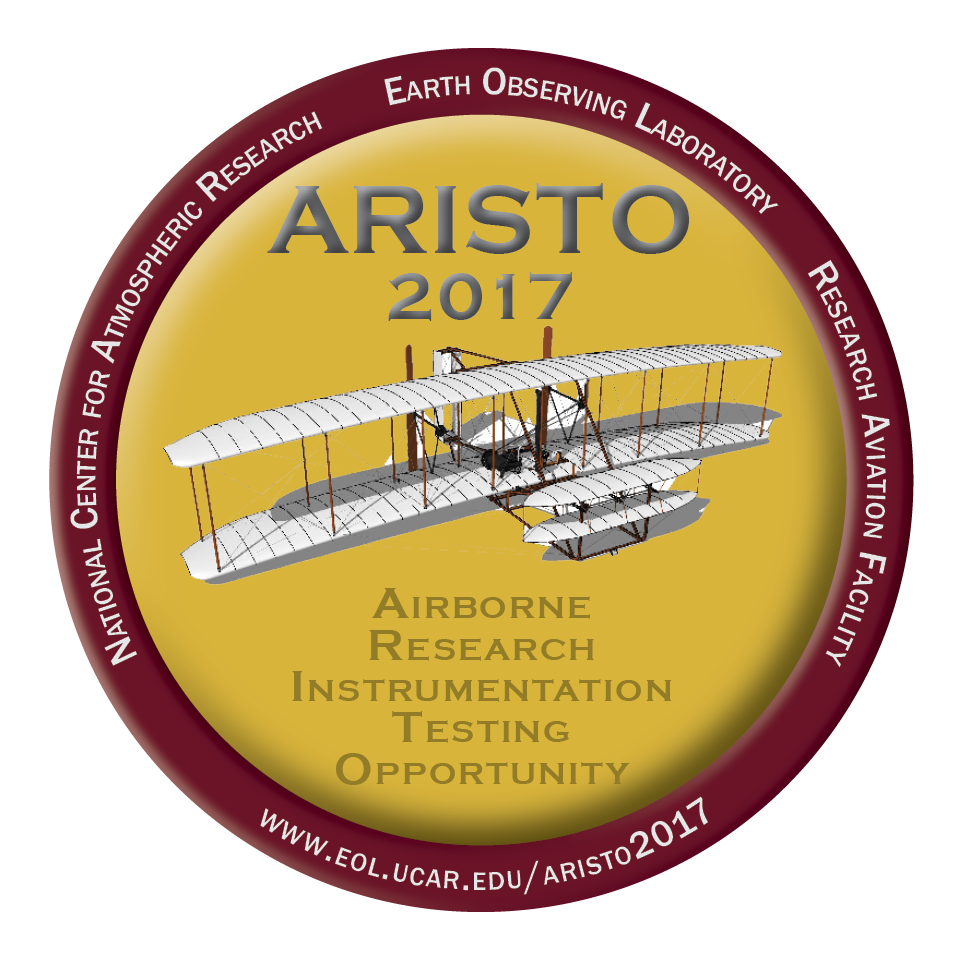ARISTO-2017
Airborne Research Instrumentation Testing Opportunity
ARISTO-2017 Annual Phase
The 2017 Annual Phase of the ARISTO program has been approved to provide an opportunity to, primarily, test updated instrumentation that will be participating in the SOCRATES field campaign. These instruments include the HIAPER cloud radar, the cold flow diffusion chamber, the counterflow virtual impactor, In addition, new NSF funded POLAR (a downward-looking aerosol and water turbidity lidar) and GPIT (pod-mounted inlet flow characterization instrument for future chemistry instruments) and the JPL microwave temperature and humidity profiler experiments are participating.
The CVI instrument is testing the completely re-written operating software and a new inlet line, which is longer than ever due to the instrument location, and is subject to unusual temperature gradients. The CFDC instrument is testing in-flight re-icing and updated flow schematic, as well as undergoes flow verification and sampling through the CVI. The HCR is testing a redundant inertial reference system and investigating a minor radio frequency interference.
Other participating instruments are the PHIPS, which is verifying performance on the high-airspeed Gulfstream; 2DC; 2D-S, that has not flow on the GV before; a CDP with an updated probe tips, which are intended to reduce droplet shattering; and LAMS (laser air motion sensor), which is intended to assist in determining the performance of the recently added GV pitot static system. The upgraded pitot static system features a reduced length transducer line, intended to reduce resonance in the tubing and provide more accurate high frequency response to turbulence.
The NSF-NCAR GV aircraft is assigned to the program, and the total amount of flight hours is 20. One of the objectives of the project is to test and validate the performance of the recently updated AVAPS temperature and humidity sensors, which are new and will be part of SCRATES. This testing requires dropsonde releases over open ocean, therefore one of the test flights will take place over the Pacific ocean. The rest of the flights will take place over Northern Colorado, Nebraska and Wyoming, where a FAA designated area approved for project lidar testing is located.
What is ARISTO?
 The Airborne Research Instrumentation Testing Opportunity (ARISTO) is a newly-created NSF-sponsored flight test program that will be conducted annually on one of the NSF/NCAR aircraft. The purpose of the ARISTO program is to provide regular flight test opportunities for newly developed or highly modified instruments as part of their development effort. The program was created in response to a critical need, expressed by the NSF community, for regularly scheduled flight-testing programs to be able to not only test instrumentation, but also data systems, inlets and software well ahead of a field campaign in order to maintain cutting-edge and vibrant airborne research. Click here to view the original ARISTO proposal.
The Airborne Research Instrumentation Testing Opportunity (ARISTO) is a newly-created NSF-sponsored flight test program that will be conducted annually on one of the NSF/NCAR aircraft. The purpose of the ARISTO program is to provide regular flight test opportunities for newly developed or highly modified instruments as part of their development effort. The program was created in response to a critical need, expressed by the NSF community, for regularly scheduled flight-testing programs to be able to not only test instrumentation, but also data systems, inlets and software well ahead of a field campaign in order to maintain cutting-edge and vibrant airborne research. Click here to view the original ARISTO proposal.
The ARISTO 2017 flight test program will take place in late winter 2017 at EOL's Research Aviation Facility (RAF) located at Rocky Mountain Metropolitan Airport (RMMA) in Broomfield, CO. The 2017 version of ARISTO will take place on the NSF/NCAR GV aircraft. Information on eligibility, proposal submission, timelines, and instrument requirements can be found on this page.
Who is eligible to participate in ARISTO?
All instrument developers/investigators with existing NSF funds related to instrumentation are eligible to apply for access to the NSF/NCAR aircraft for this instrumentation testing. Investigators selected for instrument testing are required to provide appropriate details on their instrument and comply with EOL/RAF certification requirements.
Please note that this flight-testing program is not intended to provide flight opportunities for commercial instrument builders or for the collection of proprietary data for commercial instrument development. Test flight opportunities can be opened to investigators with instrument developments funded by non-NSF U.S. agencies, however those arrangements will have to be negotiated between the cognizant Program Officers.
Proposals will be ranked and instruments will be selected for testing based on the following prioritized criteria:
- Priority 1: Instrumentation that is essential to an NSF-funded or proposed field campaign but that has yet to be test flown and certified on an NSF/NCAR aircraft.
- Priority 2: Instrumentation that has recently been developed or is being modified as part of a funded NSF grant or cooperative agreement.
- Priority 3: Instrumentation that has a high likelihood of being routinely used by the NSF community in future field campaigns.
- Priority 4: Instrumentation that is of high relevance to unfulfilled needs in the Lower Atmospheric Observing Facilities (LAOF) and/or in the U.S. airborne research fleet.
- Priority 5: Instrumentation that has a high likelihood of being ready for flight-testing and complies with all EOL/RAF certification guidelines.
If you have questions on whether or not you are eligible for ARISTO, please contact a RAF Project Manager (raf-pm@ucar.edu).
Key Dates for Instrument Principal Investigators
15 July 2016: Proposal submission period opens
9 September 2016: Proposal submission period closes
4 November 2016: NSF announces final funding decision on ARISTO project
18 November 2016: Instrument certification paperwork due to EOL/RAF
9 January 2017: Aircraft integration period
20 February - 10 March 2017: Flight test period
Click here to see detailed timeline of ARISTO-2017.
Data Manager
EOL Archive, NCAR/EOL/DMS